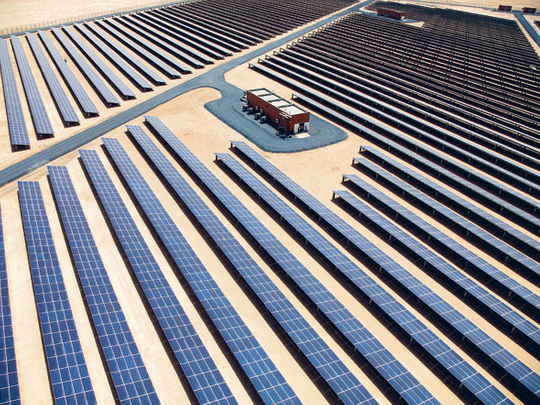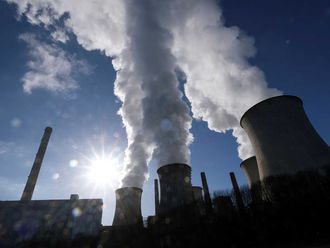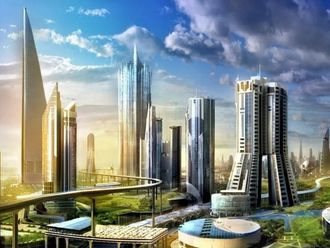
Abu Dhabi: Masdar said Wednesday it has appointed the bidding consortium of Total and Abengoa Solar as a partner to own, build and operate the emirate's $600 million Shams-1, the world's largest solar power plant.
Masdar will hold a 60 per cent stake in the venture, while Total and Abengoa Solar would each hold a 20 per cent stake, the company said.
The construction of the solar plant at Madinat Zayed, about 120km southwest of Abu Dhabi, is set to begin during the third quarter of this year with commercial delivery expected in the third quarter of 2012.
"It will offset 170,000 tons of carbon dioxide annually, create jobs for UAE nationals and diversify our energy portfolio," said Masdar CEO Dr Sultan Al Jaber .
"Shams-1 will allow Masdar to transfer to Abu Dhabi the knowhow and expertise we have gained from our involvement in developing world-class renewable energy projects abroad, thus not only opening the door for renewable energy projects in the UAE but also for technology transfer, contributing towards the development of a knowledge-based economy," he said.
Shams-1 will contribute towards Abu Dhabi's target of achieving seven per cent renewable energy power generation capacity by 2020.
Shams-1 project manager Mohammad Hilal Al Za'abi said power demand in Abu Dhabi was growing quickly and was expected to reach 20 gigawatts by 2020.
"Shams-1 will participate in the Western Region's development, when the project is commissioned two years from now," Al Za'abi said.
Al Za'abi said Abu Dhabi hoped to achieve energy diversity by investing in renewable, nuclear and conventional power sources, and by maximising the efficiency of energy use.
Shams-1 is registered as a project under the United Nations Clean Development Mechanism and is eligible for carbon credits.
The plant's CO2 displacement will be equivalent to planting 1.5 million trees or removing 15,000 cars from Abu Dhabi's roads.
The national capital is positioning itself as a platform for fighting global warming and climate change issues.
Last year, Masdar, which is owned by the Abu Dhabi government's investment arm Mubadala Development Company, broke ground on Masdar City, described as what will be the world's first zero-carbon, zero-waste, car-free city.
Al Jaber at the time announced a development budget of $22 billion for the project.
Masdar said it hoped to maximise the benefits of sustainable technologies, such as photovoltaic cells and concentrated solar power. It hoped to reduce carbon emissions and manage and develop other renewable energy sources such as wind and water.
Masdar City is designed to save the equivalent of more than $2 billion in oil over the next 25 years, based on today's energy prices.
It was also expected to create more than 70,000 jobs and add more than two per cent to Abu Dhabi's annual gross domestic product.
Renewable energy
- $600m cost of the Shams-1 solar power plant
- 60% Masdar's stake in the Shams-1 venture












